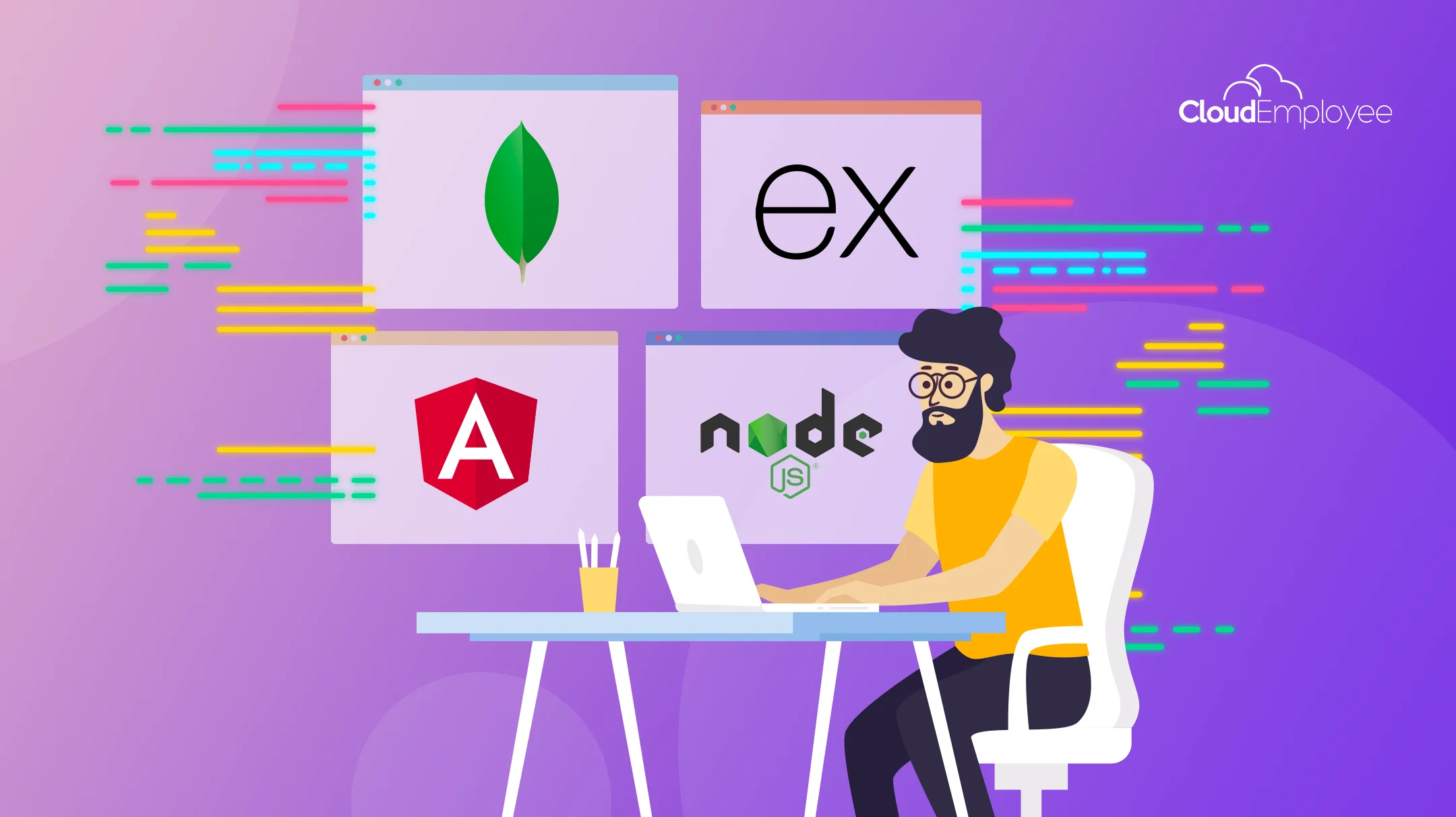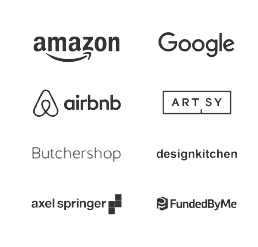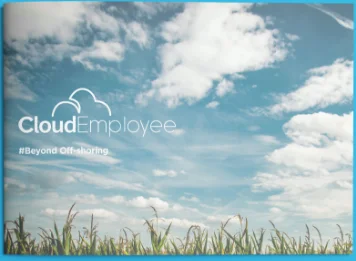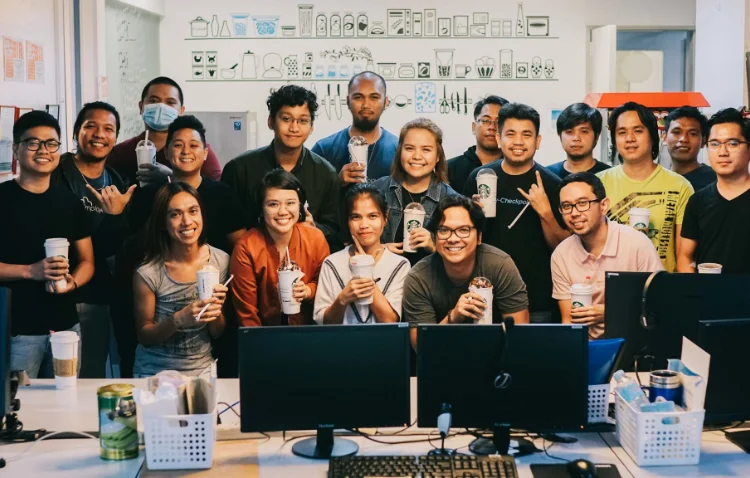Almost 95.2% of websites use JavaScript as their client-side programming language. And almost every device today runs on JavaScript. As a result, frameworks using JavaScript like MEAN Stack, have become popular and widespread. Ultimately, MEAN stack developers have become one of the most in-demand developers around.
MEAN is an open-source web stack. It is often used to develop scalable, flexible, and extensible applications suitable for cloud deployment. Since every technology in MEAN uses the same programming language, developers can reuse code across technologies.
If you’re a student or a developer who’s new to MEAN, here’s a quick guide on how to become a MEAN Stack developer.
But first, let’s get to know about who they are and what they do.
What does MEAN Stack developer do?
For starters, a MEAN Stack developer is a full stack developer who specialises in using JavaScript’s MEAN Stack. Since they are full stack developers, they work on both the front-end and back-end of an application.
And because MEAN is JavaScript-based, a MEAN stack developer should be well-versed in the JavaScript language.
Through MEAN’s four core languages, MEAN stack developers must be able to create various websites like news aggregation sites. They also need to create web applications such as calendars, mapping, and location finding.
What is the difference between a MEAN Stack developer and Full-Stack developer?
MEAN Stack developers are full stack developers that only focus on using MongoDB, Express.js, Angular, and Node.js. They only know certain parts of web development.
On the other hand, a full stack developer is someone who knows all the stages of web development. However, they are not automatically an expert on every layer of development. Full stack developers only have the functional knowledge and ability to develop a web application from start to finish. Part of full stack developer skills includes being adept in basic technologies. These include HTML/CSS, JavaScript, back-end language, databases and web storage. Others include basic algorithms and data structures, web application architecture, HTTP, REST, and Git.
Related Article: Front-end and Back-end Developers: A Quick Comparison
What companies use MEAN Stack?
Numerous startups and large firms use MEAN for their web development.
Huge tech companies such as Google, LinkedIn, Netflix, PayPal, and Uber use MEAN for their business.
Now we know what a MEAN stack developer is and its difference from a full stack developer. Let’s now move on to the technologies and concepts that an expert in MEAN should know.
Learn the Four Major Technologies
MEAN stands for MongoDB, Express.js, Angular, and Node.js. They are the core programming languages. MongoDB is the database server. While Express.js is the server-side framework. Angular is the client-side framework. And Node.js is the JavaScript runtime on the server.
Let’s go through each of them in details.
MongoDB
MongoDB is an open-source NoSQL database. It allows applications to be more scalable both in performance and in storage. This JavaScript database is the first choice for many MEAN stack developers and businesses. This is especially true when managing massive data with tons of tables.
MongoDB is widely used because of its features. These include the document-oriented database, auto-sharding, and index on attributes. MongoDB also has fast in-place updates, high availability, rich queries, replication, and professional support.
Mastering MongoDB allows MEAN stack developers to create various functions. For instance, user data management, mobile and social infrastructure, and content management and delivery.
Also, since JavaScript is used throughout the MEAN, there’s no need to translate the data as it goes through each technology. The application can easily push data between the database and the back-end.
Express.js
Express.js (or Express) is known as the back-end of MEAN. It is a fast and minimalist web application framework for Node.js. With its full feature set, it enables MEAN stack developers to build a web server easily.
Express handles the interactions between the front-end and database. It manages the cookies, handling routes, especially forming responses. Since it was designed for Node.js, it’s also often referred to as the standard server framework.
Angular
Angular is JavaScript’s default front-end framework. This means if you’re using JavaScript to develop a web app, you’re using Angular. Since the MEAN uses JavaScript, it uses Angular for its web user-facing side.
Angular didn’t automatically become the MEAN Stack’s front-end framework just because it runs on the same language. It’s an ideal and convenient front-end because of the following capabilities:
- Its ability to develop functions on desktop and mobile at the same time
- It's a high-performing framework
- Its ease of use and simplified JavaScript structure
Overall, the framework is great for developing web apps with the best user experience. It’s best used when developing video streaming apps, travel apps, and user-generated content portals.
Node.js
Node.js is one of the most popular JavaScript frameworks. It is a free and open-source server environment that runs on Windows, Mac OS, Linux, and other prominent platforms.
Learning this allows MEAN developers to create dynamic page content, write JavaScript on both client and server, collect form data, and modify data in your database.
Node.js is one of the frameworks that’s built for performance, and that’s because of these two things:
- Asynchronous-driven architecture - this means that it can manage multiple requests. If a request can’t be processed, it puts the request on hold and moves on to the next. So, it doesn’t hole up the whole queue.
- V8 JavaScript engine - this is Google’s fastest JavaScript implementation. It helps increase JavaScript’s execution inside the web browsers.
Overall, Node.js provides a more efficient connection for running a server.
Related Article: 6 Tips to Learn Programming Faster
Understand MEAN Stack development
Now the ultimate question that every starting programmer seeks to answer,
How does the MEAN Stack work?
Here’s a simple summary:
- It starts with Angular. This is JavaScript’s client-side language. Angular accepts requests by the client and processes it for the next phase.
- After Angular processes the user’s request, it enters Node.js. This is the server-side language. It is the technology that handles the client and server requests.
- Then, the request enters Express.js. This makes a request to access the database.
- After the request has been accepted, the MongoDB database stores the data and sends a response back to Express.js.
- Then Express.js sends that response back to Node.js. This forwards the response to Angular.
- Angular then displays the result to the end-user.
To summarise its flow:
Angular > Node.js > Express.js > MongoDB > Express.js > Node.js > Angular
Know other technologies used in MEAN Stack development
JSON
The MEAN primarily uses JSON (JavaScript Object Notation). It is an open-standard data-interchange format that’s easy to read and write for both the full-stack developer and machine. With JSON, there’s no need for full-stack developers to use libraries for data conversion when dealing with server-client interactions.
HTML & CSS
HTML (Hypertext Markup Language) and CSS (Cascading Style Sheets) are two of the core technologies in building web pages. HTML is used to create the page’s content structure, while CSS is used to create the page’s layout or visuals such as the font and colours.
Any MEAN developer can learn these are fundamental technologies along with JavaScript. With these three languages, MEAN stack developers can already create a functioning webpage or website.
Continuous Integration
Continuous Integration makes preparing a software release easier. This development practice requires MEAN developers to integrate code into a central repository several times in a day.
Once a code is logged in, it’s verified by an automated build. This allows the MEAN stack developers to see code issues early on.
The most popular Continuous Integration (CI) tool is Jenkins. To learn how to use it, one must have prior knowledge on Java, Nginx web server, and Ubuntu.
React.js
React.js is one of the increasingly popular JavaScript frameworks. It is a JavaScript library used to build interactive user interfaces. Some prefer using React.js instead of Angular for the MEAN Stack. This is because of its fast rendering, simplicity, and consistency as a JavaScript framework.
As a result, MERN stack developers gained popularity.
But what is a MERN Stack developer and how does it differ from a MEAN Stack developer?
They basically function like a MEAN Stack developer except that they use React.js for the UI.
Although not necessary, learning both Angular and React for this stack can make you a more flexible and competitive stack developer.
The Best MEAN Stack Developer Courses to Take
Here are some of the best courses that you can take online to give you a further understanding of MEAN Stack and to better prepare you as a developer.
Become a MEAN Stack Developer (Udemy)
Course length: Less than 8 hours
Number of lectures: 83
This is a Udemy course by Bluelime Learning Solutions. It includes an introduction to the MEAN Stack, how to install Node.js and MongoDB, basic MongoDB CRUD operations, an introduction to Git, and a guide on creating a MEAN Stack application.
The course teaches the fundamentals of MEAN, which is great for beginners. It also provides a step-by-step guide and hands-on experience of building full-stack applications using MEAN. Upon completing the course, you shall be equipped with the basics of creating a MEAN Stack application.
Related Article: 5 Best Websites to take Programming Courses
Learning MEAN Stack by Building Real World Application (Udemy)
Course length: Less than 14 hours
Number of lectures: 306
This is an online course by full-stack Javascript developer Haider Malik. This course teaches a more in-depth guide on developing MEAN Stack applications. It delves on the fundamentals of Angular, components and data bindings, Node.js server setup, and CRUD on the Node.js back end, among many others.
This course is great for beginners. It is also great even for current developers who want to learn MEAN development from scratch and to tackle advanced topics about the tech stack.
Introduction to MongoDB using the MEAN Stack (edX)
Course length: Less than 10 hours
If you’re already familiar with the basics of web development, this course can give you a deeper understanding of MEAN. You can learn from the course’s learn-by-doing approach.
In this course, developers can learn how to build REST APIs using Node.js and Express.js. You can also learn how to create single-page applications using Angular and develop mobile apps using the Ionic framework.
Learning all of these fundamentals will help prepare programming students and even current developers learn how to create various applications using the MEAN Stack.
Work with world leading tech businesses
We connect high-performing software engineer talent in the Philippines with some of the world’s leading and most innovative Tech companies.
Submit CV













